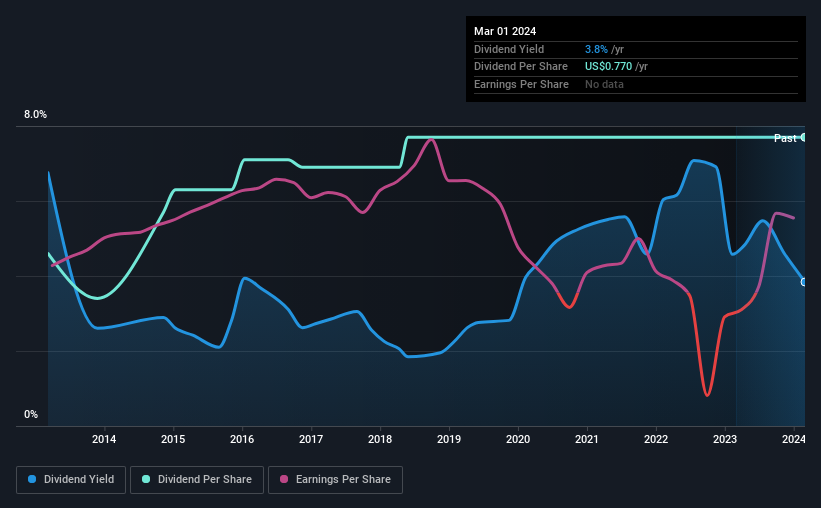Four Days Left To Buy Universal Insurance Holdings, Inc. (NYSE:UVE) Before The Ex-Dividend Date
Some investors rely on dividends for growing their wealth, and if you're one of those dividend sleuths, you might be intrigued to know that Universal Insurance Holdings, Inc. (NYSE:UVE) is about to go ex-dividend in just 4 days. The ex-dividend date is one business day before a company's record date, which is the date on which the company determines which shareholders are entitled to receive a dividend. The ex-dividend date is an important date to be aware of as any purchase of the stock made on or after this date might mean a late settlement that doesn't show on the record date. Meaning, you will need to purchase Universal Insurance Holdings' shares before the 7th of March to receive the dividend, which will be paid on the 15th of March.
The company's upcoming dividend is US$0.16 a share, following on from the last 12 months, when the company distributed a total of US$0.77 per share to shareholders. Based on the last year's worth of payments, Universal Insurance Holdings stock has a trailing yield of around 3.8% on the current share price of US$20.05. Dividends are a major contributor to investment returns for long term holders, but only if the dividend continues to be paid. That's why we should always check whether the dividend payments appear sustainable, and if the company is growing.
View our latest analysis for Universal Insurance Holdings
If a company pays out more in dividends than it earned, then the dividend might become unsustainable - hardly an ideal situation. Fortunately Universal Insurance Holdings's payout ratio is modest, at just 29% of profit.
When a company paid out less in dividends than it earned in profit, this generally suggests its dividend is affordable. The lower the % of its profit that it pays out, the greater the margin of safety for the dividend if the business enters a downturn.
Click here to see how much of its profit Universal Insurance Holdings paid out over the last 12 months.
Have Earnings And Dividends Been Growing?
Businesses with shrinking earnings are tricky from a dividend perspective. If earnings fall far enough, the company could be forced to cut its dividend. Universal Insurance Holdings's earnings per share have fallen at approximately 7.2% a year over the previous five years. When earnings per share fall, the maximum amount of dividends that can be paid also falls.
The main way most investors will assess a company's dividend prospects is by checking the historical rate of dividend growth. Universal Insurance Holdings has delivered an average of 5.3% per year annual increase in its dividend, based on the past 10 years of dividend payments.
Final Takeaway
Has Universal Insurance Holdings got what it takes to maintain its dividend payments? Earnings per share have shrunk noticeably in recent years, although we like that the company has a low payout ratio. This could suggest a cut to the dividend may not be a major risk in the near future. It might be worth researching if the company is reinvesting in growth projects that could grow earnings and dividends in the future, but for now we're on the fence about its dividend prospects.
With that being said, if dividends aren't your biggest concern with Universal Insurance Holdings, you should know about the other risks facing this business. Every company has risks, and we've spotted 2 warning signs for Universal Insurance Holdings you should know about.
If you're in the market for strong dividend payers, we recommend checking our selection of top dividend stocks.
Have feedback on this article? Concerned about the content? Get in touch with us directly. Alternatively, email editorial-team (at) simplywallst.com.
This article by Simply Wall St is general in nature. We provide commentary based on historical data and analyst forecasts only using an unbiased methodology and our articles are not intended to be financial advice. It does not constitute a recommendation to buy or sell any stock, and does not take account of your objectives, or your financial situation. We aim to bring you long-term focused analysis driven by fundamental data. Note that our analysis may not factor in the latest price-sensitive company announcements or qualitative material. Simply Wall St has no position in any stocks mentioned.

